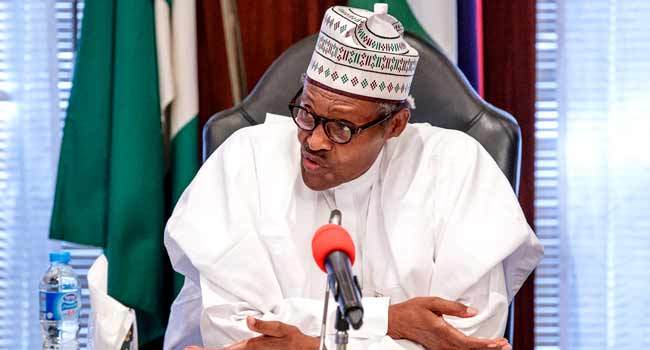President Muhammadu Buhari says the fact that Nigeria has remained a united country despite its challenges is a success which should be celebrated by Nigerians.
Buhari has also urged Nigerians to cooperate more and pray for their leaders in the quest to make Nigeria a country of their dreams.
The News Agency of Nigeria (NAN) reports that the president expressed the views at the Third Annual Conference of the Guild of Corporate Online Publishers (GOCOP) in Lagos on Friday.
The conference had the theme: “Economy, Security and National Development: The Way Forward.”
Represented by Mr Femi Adesina, Special Adviser to the President on Media and Publicity, Buhari maintained that growing the economy and addressing security challenges were works in progress.
He noted that no nation could boast of having totally achieved both, stressing that Nigerians must do away with cynicism and join the government in repositioning the country.
Buhari said: “We need to believe more, cooperate more and also pray for our leaders if we want Nigeria to succeed.
“We need to be grateful to God for where we are. There are countries who have not gone through what we have gone through that are worse off today.
“The fact that Nigeria remains a united country is a success. Good works are going on and we need to support our leaders for Nigeria to get to where we want it to be.”
Also, the keynote speaker, Bishop Matthew Kukah, Bishop of Catholic Diocese of Sokoto, blamed Nigeria’s underdevelopment and current economic woes on inconsistent policies by successive governments in the country.
Kukah said the failure of the military to return to the barracks after the Nigerian Civil War ended in 1970 had a negative effect on the nation’s socio-economic and political development.
The cleric maintained that every government has had an initiative to develop a sound economy, to alleviate poverty and to take the Nigerian people out of poverty.
These, according to him, include Farm Settlement Option (1960), National Accelerated Food Production Project, (1972), Agricultural Development Project, (1973), Operation Feed the Nation (1976), and Rural Banking Scheme, 1977.
He also cited the Green Revolution (1980), Family Support Programme (FSP), Petroleum Trust Fund (1995), National Poverty Eradication Programme (NAPEP), N-Power, Sure-P and Trader Moni, among others.
“However, they could not make measurable impact, not because they were useless, but because of our inability to make our policies consistent.
“This systemic disruption of policies accounts for our underdevelopment as a nation because each of these policies had the capacity to have transformed our country if vigorously pursued,” Kukah said.
On the role played by the military, he noted that Nigeria in the 60s and 70s had brilliant politicians who were committed to putting the country on the right path, but could not achieve much due to military incursions.
He said: “The decision of the military to stay after the civil war decapitated our elite political class.
“Having tasted power, we had further incursions in 1983, 1985 and 1993, and the cumulative impact of the coup culture on our country led to the situation we have now.”
Kukah, however, said that there was hope for Nigeria despite the economic and security challenges being faced in the country.
He said that the task of nation building required the collective efforts of both leaders and followers, stressing that Nigeria must harness its diversity to make the nation a better place for all and sundry.
Also, Bayelsa Governor, Mr Seriake Dickson, commended GOCOP for the theme of the conference, noting that there would not be a vibrant democracy without a vibrant media.
Dickson urged them to stay true to the tenets of the journalism profession in the discharge of their duties.
He also urged political leaders to learn to be tolerant of constructive criticism by the media.
The governor called on Nigerians to support comprehensive constitutional reforms that would guarantee stability and equal representation aimed at positively transforming the country. (NAN)
